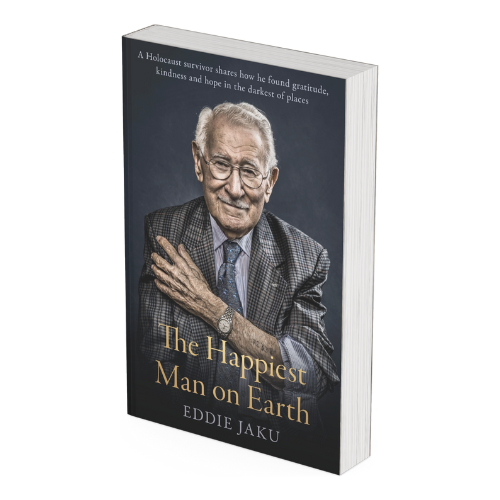The Happiest Man on Earth
by Eddie Jaku

The Author:
Eddie Jaku, born Abraham Salomon Jakubowicz in Leipzig, Germany 1920, experienced some of human history’s bleak periods. Jaku, a Holocaust survivor, was incarcerated in the Buchenwald and Auschwitz concentration camps during World War II. He resolved to embrace life with gratitude and pleasure despite the unspeakable horrors he had endured and regarded himself as the “happiest man on earth.”. Jaku immigrated to Australia after the war, becoming a prominent Jewish community member and a motivational speaker. He shared his story to inspire hope and resilience.
Summary of “The Happiest Man on Earth”
“The Happiest Man on Earth” is Eddie Jaku’s memoir, which chronicles his life from his idyllic childhood in Germany, through the harrowing experiences of the Holocaust, to his post-war life, which is dedicated to the diffusion of kindness and pleasure. The beginning of the book is when Jaku was a young child before the Nazi regime came into power. He recounts the atrocious events of Kristallnacht, the night of shattered glass, during which Jewish homes, businesses, and synagogues were looted, and he was subsequently arrested and beaten.
Jaku’s ordeal persisted in the concentration camps of Buchenwald and Auschwitz, where he encountered daily atrocities and tiny acts of kindness that maintained hope. He endured a death march and was ultimately liberated; however, his path to recovery was lengthy and complex. Jaku rebuilt his life after reuniting with his sister in Belgium. He eventually relocated to Australia and established a prosperous career and family.
Jaku underscores the significance of affection, friendship, and the human capacity for kindness in the memoir, even during the most challenging periods. His story is not just one of survival; it also shows his conscious choice to live a life of thanksgiving and pleasure.
My Thoughts on “The Happiest Man on Earth”.
Reading “The Happiest Man on Earth” has been profoundly affecting and educational. Eddie Jaku’s narrative serves as a testament to the transformative potential of a positive mindset and the resilience of the human spirit.
The concept of resilience is one of the most significant lessons to be learned from Jaku’s memoir. Despite his insurmountable obstacles, Jaku’s resilience and capacity to relish even the most insignificant moments are genuinely inspiring. As a psychotherapist, I recognise the critical significance of resilience in the context of mental fitness. Jaku’s narrative further emphasises the idea of anti-fragility by emphasising that it is not just about overcoming adversity but also finding new strength and meaning in life’s challenges.
Despite his past traumas, Jaku’s dedication to embracing each day with gratitude and pleasure serves as a poignant reminder of the influence of a positive perspective. This is consistent with the principles I promote in my practice and teachings. Encouraging gratitude can considerably enhance mental fitness and overall well-being. Jaku’s life is a compelling illustration of how adopting a mindset of gratitude and kindness can result in a fulfilling and joyful life.
Jaku emphasises the acts of compassion that provided him with the strength to endure the most challenging periods in his memoir. This underscores the significance of compassion and human connection. The story of Jaku serves as a poignant reminder of the profound influence that compassion and empathy can have on our lives and the lives of others in our fast-paced, frequently disconnected world. This message is essential and pertinent to me as a professional promoting emotional well-being.
Perhaps the most profound lesson of all is Jaku’s conscientious decision to prioritise happiness and reject bitterness and hatred. It demonstrates that, despite being unable to control the events that occur to us, we can control our responses. Empowering individuals to take control of their emotional responses and choose paths that lead to fulfilment and serenity is at the core of my approach to therapy and coaching.
I encourage clients and colleagues to incorporate the lessons from “The Happiest Man on Earth,”
- Practice Gratitude Daily – Maintaining a gratitude journal or frequently thinking about the positive aspects of life can foster a more optimistic outlook.
- Develop Resilience—Cultivating resilience through supportive relationships, physical activity, and mindfulness can help individuals more effectively navigate life’s obstacles.
- Participate in Acts of Kindness – Small acts of kindness can enhance the well-being of both the giver and the receiver and fortify social connections.
- Opt for optimism. By emphasising the influence of choice in their emotional responses, individuals can concentrate on pleasure and development, even in the face of adversity.
In summary, Eddie Jaku’s “The Happiest Man on Earth” is not merely a memoir; it is a manual for leading a resilient and fulfilling life. His narrative serves as a testament to the resilience of the human spirit and a source of optimism. Jaku’s life and the wisdom he shares as someone who genuinely cares about the well-being of others profoundly inspires me. I suggest this book to those interested in comprehending the concepts of resilience and the pursuit of happiness.
The Happiest Man on Earth
by Eddie Jaku

The Author:
Eddie Jaku, born Abraham Salomon Jakubowicz in Leipzig, Germany 1920, experienced some of human history’s bleak periods. Jaku, a Holocaust survivor, was incarcerated in the Buchenwald and Auschwitz concentration camps during World War II. He resolved to embrace life with gratitude and pleasure despite the unspeakable horrors he had endured and regarded himself as the “happiest man on earth.”. Jaku immigrated to Australia after the war, becoming a prominent Jewish community member and a motivational speaker. He shared his story to inspire hope and resilience.
Summary of “The Happiest Man on Earth”
“The Happiest Man on Earth” is Eddie Jaku’s memoir, which chronicles his life from his idyllic childhood in Germany, through the harrowing experiences of the Holocaust, to his post-war life, which is dedicated to the diffusion of kindness and pleasure. The beginning of the book is when Jaku was a young child before the Nazi regime came into power. He recounts the atrocious events of Kristallnacht, the night of shattered glass, during which Jewish homes, businesses, and synagogues were looted, and he was subsequently arrested and beaten.
Jaku’s ordeal persisted in the concentration camps of Buchenwald and Auschwitz, where he encountered daily atrocities and tiny acts of kindness that maintained hope. He endured a death march and was ultimately liberated; however, his path to recovery was lengthy and complex. Jaku rebuilt his life after reuniting with his sister in Belgium. He eventually relocated to Australia and established a prosperous career and family.
Jaku underscores the significance of affection, friendship, and the human capacity for kindness in the memoir, even during the most challenging periods. His story is not just one of survival; it also shows his conscious choice to live a life of thanksgiving and pleasure.
My Thoughts on “The Happiest Man on Earth”.
Reading “The Happiest Man on Earth” has been profoundly affecting and educational. Eddie Jaku’s narrative serves as a testament to the transformative potential of a positive mindset and the resilience of the human spirit.
The concept of resilience is one of the most significant lessons to be learned from Jaku’s memoir. Despite his insurmountable obstacles, Jaku’s resilience and capacity to relish even the most insignificant moments are genuinely inspiring. As a psychotherapist, I recognise the critical significance of resilience in the context of mental fitness. Jaku’s narrative further emphasises the idea of anti-fragility by emphasising that it is not just about overcoming adversity but also finding new strength and meaning in life’s challenges.
Despite his past traumas, Jaku’s dedication to embracing each day with gratitude and pleasure serves as a poignant reminder of the influence of a positive perspective. This is consistent with the principles I promote in my practice and teachings. Encouraging gratitude can considerably enhance mental fitness and overall well-being. Jaku’s life is a compelling illustration of how adopting a mindset of gratitude and kindness can result in a fulfilling and joyful life.
Jaku emphasises the acts of compassion that provided him with the strength to endure the most challenging periods in his memoir. This underscores the significance of compassion and human connection. The story of Jaku serves as a poignant reminder of the profound influence that compassion and empathy can have on our lives and the lives of others in our fast-paced, frequently disconnected world. This message is essential and pertinent to me as a professional promoting emotional well-being.
Perhaps the most profound lesson of all is Jaku’s conscientious decision to prioritise happiness and reject bitterness and hatred. It demonstrates that, despite being unable to control the events that occur to us, we can control our responses. Empowering individuals to take control of their emotional responses and choose paths that lead to fulfilment and serenity is at the core of my approach to therapy and coaching.
I encourage clients and colleagues to incorporate the lessons from “The Happiest Man on Earth,”
- Practice Gratitude Daily – Maintaining a gratitude journal or frequently thinking about the positive aspects of life can foster a more optimistic outlook.
- Develop Resilience—Cultivating resilience through supportive relationships, physical activity, and mindfulness can help individuals more effectively navigate life’s obstacles.
- Participate in Acts of Kindness – Small acts of kindness can enhance the well-being of both the giver and the receiver and fortify social connections.
- Opt for optimism. By emphasising the influence of choice in their emotional responses, individuals can concentrate on pleasure and development, even in the face of adversity.
In summary, Eddie Jaku’s “The Happiest Man on Earth” is not merely a memoir; it is a manual for leading a resilient and fulfilling life. His narrative serves as a testament to the resilience of the human spirit and a source of optimism. Jaku’s life and the wisdom he shares as someone who genuinely cares about the well-being of others profoundly inspires me. I suggest this book to those interested in comprehending the concepts of resilience and the pursuit of happiness.
“The greatest glory in living lies not in never falling, but in rising every time we fall.”
Recent Thoughts
When Love Turns to Hate: Why Justice Must Stay in the Courtroom and Not Online
As a therapist working closely with couples and individuals in high-conflict relationships, I have seen the full emotional arc of love, from intimacy
Stress at the Top
Why Leadership in Malta is More Isolated Than You Think We often picture business leaders as confident, driven, and in control. They make



